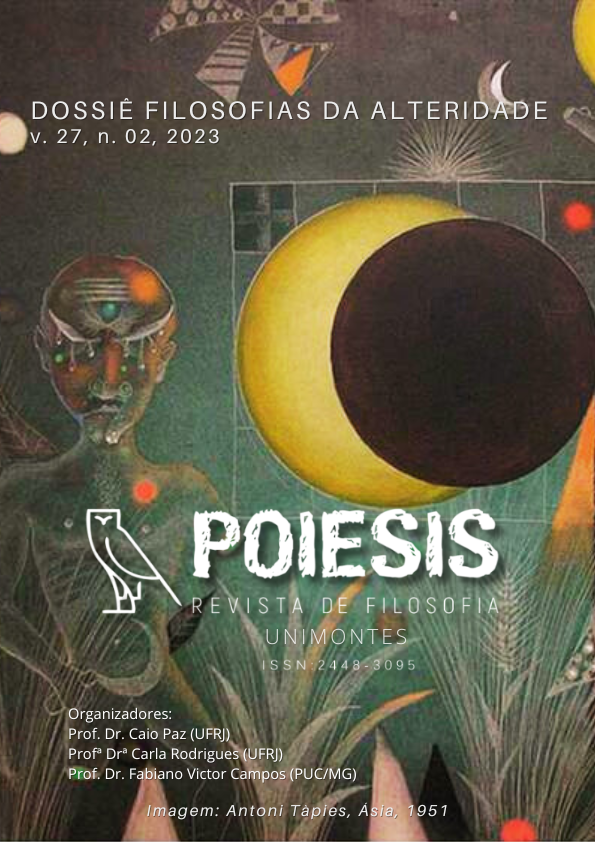BETWEEN TRACES: PRELUDE TO TWO THOUGHTS OF OTHERNESS
DOI:
10.46551/2448-30952023v27n207Keywords:
Alterity, Derrida, Levinas, Temporality, TraceAbstract
Jacques Derrida and Emmanuel Levinas, in their respective philosophical approaches, emphasize that the model of thought and language proposed by Western philosophy has resulted in a violent reduction in the understanding and communication of reality and human relationships, due to the persistent emphasis on categories such as presence and identity. Faced with this situation, Derrida and Levinas propose to disarticulate the primacy of identity as the exclusive holder of knowledge and language. Additionally, they question the pretension of discourse on totality that seeks to reduce the world, relationships, and the transcendent to the primacy of consciousness. As a result, the philosophers have rejected the status of philosophies of presence in the philosophical tradition, presenting common foundations for another way of doing philosophy. Drawing from the analysis of Emmanuel Levinas's article "The Trace of the Other" and Jacques Derrida's book "Margins of Philosophy," this article aims to demonstrate how the notion of the trace allows for latent intertextuality in the thought of these authors. The trace is not limited to being a simple mark left by the other or a purely physical vestige. Instead, it urges us to go beyond any obvious sign and realize that, in the context of deconstruction and the ethics of responsibility, the trace points to a different conception of temporality. Furthermore, both philosophers explore the notion of the trace, indicating a radical alterity that eludes apprehension, whether through language or ethical relation. This alterity is conceived as an absolute and irreducible difference. Thus, by introducing the notion of trace, the philosophers invite us to welcome the wholly other (tout autre), which eludes our conventional conceptions. They urge us to recognize the complexity and richness of human relationships and the reality that surrounds us.
Downloads
References
BENNINGTON, Geoffrey. Desconstrução e Ética. In: Desconstrução e Ética: Ecos de Jacques Derrida. DUQUE-ESTRADA, P. C. (Org.). Rio de Janeiro: Ed. PUC-Rio; São Paulo: Loyola, 2004, p.9-31.
DERRIDA, Jacques. Margens da filosofia. Trad. Joaquim Torres Costa, António M. Magalhães. Campinas: Papirus, 1991.
________. Pensar em não ver. In: Pensar em não ver: escritos sobre a arte do visível (1979-2004). MICHAUD, G.; MASÓ, J.; BASSAS, J. (Orgs.). Trad. Marcelo Jacques de Moraes. Florianópolis: Ed. da UFSC, 2012.
________. Freud e a cena da escritura. In: A escritura e a diferença. 4ªed. Tradução: M. B. Marques Nizza da Silva, P. L. Lopes e Pérola de Carvalho. São Paulo: Perspectiva, 2009.
________. Violência e metafísica: ensaio sobre o pensamento de Emmanuel Levinas. In: A escritura e a diferença. 4ªed. Tradução: M. B. Marques Nizza da Silva, P. L. Lopes e Pérola de Carvalho. São Paulo: Perspectiva, 2009.
________. O animal que logo sou. Trad. Fábio Landa. São Paulo: Editora UNESP, 2002.
________. Adeus a Emmanuel Levinas. São Paulo: Perspectiva, 2008.
________. A farmácia de Platão. Trad. Rogério da Costa. São Paulo: Iluminuras, 2005.
________. J. Anne Dufourmantelle convida Jacques Derrida a falar Da Hospitalidade. São Paulo: Escuta, 2003.
DUQUE-ESTRADA, P. C. Derrida e a escritura. In: Às margens: A propósito de Derrida. Rio de Janeiro: Ed. PUC/Rio; São Paulo: Loyola, 2002.
GAGNEBIN, J. M. Apagar os rastros, recolher os restos. In: Walter Benjamin: rastro, aura e história. SEDLMAYER, S.; GINZBURG, J. (Orgs.). Belo Horizonte: Editora UFMG, 2012.
HADDOCK-LOBO, R. Da existência ao infinito: ensaios sobre Emmanuel Levinas. Rio de Janeiro: Ed. PUC-Rio; São Paulo: Loyola, 2006.
LEVINAS, Emmanuel. O vestígio do outro. In: Descobrindo a existência com Husserl e Heidegger. Lisboa: Instituto Piaget, 1997.
________. Da descrição à existência. In: Descobrindo a existência com Husserl e Heidegger. Lisboa: Instituto Piaget. 1997.
________. Autrement qu’être ou au-delà de l’essence. Kluwer Academic: Livre de Poche, 1978.
________. Deus e a filosofia. In: De Deus que vem à ideia. Petrópolis, RJ: Vozes, 2002.
________. Totalidade e Infinito. Lisboa: Edições 70, 2000.
________. Ética e Infinito. Lisboa: Edições 70, 1982.
PELIZZOLI, M. L. Levinas: a reconstrução da subjetividade. Porto Alegre: EDIPUCRS, 2002.
RIBEIRO JR, Nilo. Sabedoria da Paz: Ética e teo-lógica em Emmanuel Levinas. São Paulo: Edições Loyola, 2008.
RIBEIRO, L. M. A subjetividade e o outro: Ética da responsabilidade em Emmanuel Levinas. São Paulo: Ideias & Letras, 2015.
RODRIGUES, C. Duas palavras para o feminino: hospitalidade e responsabilidade: [sobre ética e política em Jacques Derrida. Rio de Janeiro: Nau, 2013.
ZAGALO, Gonçalo. O texto fora-dos-eixos: O “fora” em Jacques Derrida. In: PELLEJERO, Eduardo; ANGHEL, Golgona (Orgs.). Fora da filosofia: Da fenomenologia à desconstrução. Vol. II. Centro de Filosofia das Ciências da Universidade de Lisboa. Lisboa: Fundação para a ciência e a tecnologia, Ministério da Ciência, Tecnologia e Ensino Superior, 2010.
ZEVALLOS, V. Desconstrução e hospitalidade: entre a ética e a política. Revista Ethic@, Florianópolis, v. 21, n. 1, Mai., 2022, p.112-126.
Downloads
Published
How to Cite
Issue
Section
License
Copyright (c) 2024 Revista Poiesis

This work is licensed under a Creative Commons Attribution-NonCommercial-NoDerivatives 4.0 International License.





.png)

